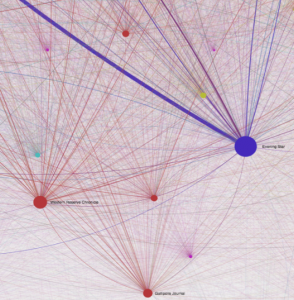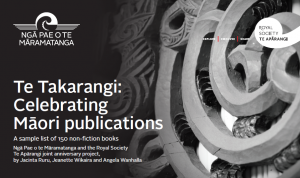 Come find out what happens as bibliography moves into the 21st century and encounters mass digitisation. Professor Cordell, author of the essay, “‘Q i-jtb the Raven’: Taking Dirty OCR Seriously” in the most recent volume of Book History, is a leading investigator of the advantages and challenges of digital sources.
Come find out what happens as bibliography moves into the 21st century and encounters mass digitisation. Professor Cordell, author of the essay, “‘Q i-jtb the Raven’: Taking Dirty OCR Seriously” in the most recent volume of Book History, is a leading investigator of the advantages and challenges of digital sources.
Here’s how Ryan explains his lecture:
“Scholars are outlining methods for describing the provenance and material-technical structures of mass-digitized texts. Computational methods help scholars trace textual structures largely outside the purview of traditional bibliography, such as the reprinted newspaper snippets we study in the Viral Texts Project (viraltexts.org). The clusters of matching texts output by our algorithm are, in a sense, enumerative bibliographies: each cluster lists witnesses of a given text, along with the metadata (e.g. date, title) of the newspapers that reprinted it.
But not quite. Really, each cluster lists texts similar enough under our algorithm’s constraints, which shift as we alter parameters such as the length, number, or overlap of matching strings required for texts to match. Resulting clusters are generally reliable as witnesses, but there are inevitably false positives and false negatives (e.g. OCR error). Moreover, clusters include types of repetition beyond witnesses, such as extended quotations of one text within another. Given that our algorithm outputs millions of individual clusters—each comprising between two and several hundred matched texts—we will never have the funding or hours to check even a fraction.
This paper proposes “speculative bibliography” as an interpretive frame for understanding the objects created through computational, statistical, and probabilistic methods such as those described above or, to cite a more common example, the results of keyword searches. Beginning with Tanselle’s proposed definition of the electronic edition as “all copies resulting from a *single job of typographical composition*,” the paper will propose the speculative edition: all texts associated through a single computational process. Beyond naming existing practices, the paper will argue that conscious engagement with speculative editions will be increasingly necessary for grounding meaningful exploration amid conditions of mass digitization.”
5:30 pm Monday, 23 April, Burns 5 of the Arts Building, University of Otago
 Please join us in the Hocken Seminar Room at noon next Thursday for a panel discussion by Jacinta Ruru, Jeanette Wikaira and Angela Wanhalla on “The Origins and Intent for Celebrating 150 Māori Non-Fiction Books” Part of a larger project, Te Takarangi: Celebrating Māori publications, the aim is to highlight one non-fiction book per day for 150 days starting on 13 February and ending in September this year to coincide with Te Taura Whiri i te Reo Māori | Te Wiki o te Reo Māori – Māori Language Week.
Please join us in the Hocken Seminar Room at noon next Thursday for a panel discussion by Jacinta Ruru, Jeanette Wikaira and Angela Wanhalla on “The Origins and Intent for Celebrating 150 Māori Non-Fiction Books” Part of a larger project, Te Takarangi: Celebrating Māori publications, the aim is to highlight one non-fiction book per day for 150 days starting on 13 February and ending in September this year to coincide with Te Taura Whiri i te Reo Māori | Te Wiki o te Reo Māori – Māori Language Week.

